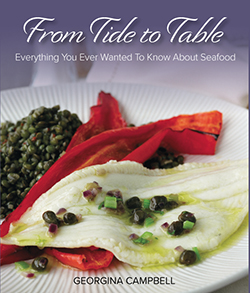Insider View - Airbnb

This month Lucy Madden considers the rampant rise of Airbnb - and the merits of spending precious time and money with people who know what they are doing, i.e. the hospitality professionals
Once a week in our local town a van selling fish sets up stall a sardine’s toss from the supermarket where each day is offered a good display of seafood. The supermarket pays rates and rents and employs a number of people to offer goods and services on a daily basis.
I can see the point of bringing fish to fishless towns and villages, but to undercut a going and committed concern that contributes much to the local community is a little cheeky. Nose in air, this goody-two shoes makes a point of ignoring the fish van as she passes with a conspicuous shop-bought fish head poking out of her shopping basket.
To me, the fish van has some parallels with Airbnb. This internet phenomenon started small in 2008 in an attic in San Francisco, where two young men rented out mattresses to people attending a conference, and has burgeoned into the World of Trips presiding over a global ‘community’ (endorsed by Hollywood celebrities, always a bad sign), who open their homes in order to lure tourists away from bona fide hotels, guest houses and bed and breakfast establishments. These latter businesses, as anyone who has ever run one knows, before opening must endure an inquisition with form-filling and inspections and the hovering presence of Health and Safety.
Meanwhile Jo and Josephine Soap are at liberty to open the doors of their private houses and apartments offering accommodation at lesser prices than open-all-year establishments with trained staff: in other words, the professionals. But there are signs that this global monolith may be a victim of its own success.
The observation that good ideas are taken over by the wrong people could apply here. Disquiet is being voiced about the online rental company being shown to have a possible deleterious effect on local housing rental markets. Stricter controls are being called for.
This is for others to determine. And admittedly, I know of many people, including members of my own family, who have had good experiences staying in rooms through Airbnb, I know of others who have been confronted with rude hosts, shared bathrooms, long flights of stairs up to poky and dirty accommodation. And the truth is that many guests are reluctant to complain and on the website will accord the host a better rating than is deserved.
The pitfalls are of a hospitality platform where the premises are not vetted, allowing utterly misleading information to proliferate, where upfront payment, often not refundable, is demanded, and where the lack of checks and boundaries can lead to disappointment and resentment. For both parties, hosts and guests, this may be so.
Who would willingly open their home to strangers or, for that matter, spend the night in an unknown and alien household? It’s clear that the promoters of this platform are internet whizzes, but from feedback from their hosts it would appear they know little about the practicalities of running a hospitality business. In particular they seem like innocents abroad where gougers, review blackmailers and other undesirables are concerned.
All this aside, when, a few months ago, my husband who had recently become an Airbnb host (yes we were at it too) started muttering about ‘cultish behaviour’, I scoffed loudly. We had had our experience of cults.
We had brushed with Scientology. I remembered too in the 1960s when my sister became involved with pyramid selling and how she had returned from a ‘Mind Dynamics’ weekend such a changed person with a glazed expression and irrational views. This surely is a million miles from organisations like Airbnb that just offer travellers the experience of staying, cheaply, in private accommodation. And yet. There are elements in their language which strike me as being increasingly creepy.
In a short space Airbnb has transmogrified into becoming the ‘Travel Agent of the 21st Century’. Its Masterplan is to Own Every Part of your Trip. Do we really want this? But the most worrying part of the whole enterprise to me is the new command that hosts and guests sign up to the Community Commitment; refusal to do so resulting in banishment. This edict promises the usual non-discrimination in terms of race, gender, sexual orientation etc. and strikes me as controlling, patronising and way outside their remit.
We have for decades had the great good fortune to be included in a number of prestigious guides, none of which have ever made us sign up to a code of conduct. They do not invite members unless they are happy they know how to behave.
The language of Airbnb, which is essentially a profit-making organisation, and clearly a very successful one, is increasingly disturbing, seeking to create a world of ‘a Community of us’ and ‘them, who don’t conform’.The irony of this is that the ‘non-discriminatory’ inner circle becomes more and more exclusive.
Maybe I am missing something here, but why on earth when you decide to spend precious time and money away from your own home, would you not prefer to do it with people who know what they are doing – in other words, the professionals?
 Together with her husband Johnny & family, Lucy Madden owns the magnificent 18th century mansion, Hilton Park, Clones, Co Monaghan which is run by their son and daughter-in-law, Fred and Joanna, as an Ireland’s Blue Book country house, and open to private guests, groups, small weddings and conferences. The restored formal gardens are also open by arrangement. Lucy is a keen organic gardener and also a member of the Irish Food Writers’ Guild.
Together with her husband Johnny & family, Lucy Madden owns the magnificent 18th century mansion, Hilton Park, Clones, Co Monaghan which is run by their son and daughter-in-law, Fred and Joanna, as an Ireland’s Blue Book country house, and open to private guests, groups, small weddings and conferences. The restored formal gardens are also open by arrangement. Lucy is a keen organic gardener and also a member of the Irish Food Writers’ Guild.






There are currently no comments
Leave a comment
Not a member? Register for your free membership now!
Or leave a comment by logging in with: